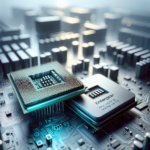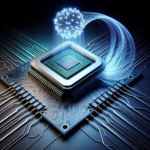Understanding the Differences Between Consumer and Enterprise CPUs

Understanding the Differences Between Consumer and Enterprise CPUs
In the world of computing, the Central Processing Unit (CPU) is often referred to as the “brain” of the computer. It is responsible for executing instructions and processing data, making it a critical component in both consumer and enterprise systems. However, not all CPUs are created equal. Consumer CPUs and enterprise CPUs are designed with different priorities and use cases in mind. This article aims to provide a comprehensive understanding of the differences between these two types of CPUs, helping you make informed decisions based on your specific needs.
What is a CPU?
Before diving into the differences, it’s essential to understand what a CPU is and its role in a computer system. The CPU, or Central Processing Unit, is a microprocessor that performs the basic arithmetic, logic, control, and input/output (I/O) operations specified by the instructions in a computer program. It is a critical component that determines the overall performance of a computer system.
Consumer CPUs
Definition and Purpose
Consumer CPUs are designed for general-purpose computing tasks that are typically performed by individual users. These tasks include web browsing, word processing, gaming, and multimedia consumption. Consumer CPUs are optimized for a balance of performance, power efficiency, and cost.
Key Features
- Performance: Consumer CPUs are designed to handle a wide range of applications efficiently. They often feature multiple cores and threads to improve multitasking and performance in multi-threaded applications.
- Power Efficiency: Power consumption is a critical factor for consumer CPUs, especially in laptops and mobile devices. These CPUs are designed to provide high performance while minimizing power usage to extend battery life.
- Cost: Consumer CPUs are generally more affordable than enterprise CPUs. They are designed to offer good performance at a reasonable price, making them accessible to a broad audience.
- Integrated Graphics: Many consumer CPUs come with integrated graphics, eliminating the need for a separate graphics card for basic tasks like web browsing and video playback.
Popular Consumer CPU Models
Some popular consumer CPU models include:
- Intel Core i3, i5, i7, and i9 series
- AMD Ryzen 3, 5, 7, and 9 series
Enterprise CPUs
Definition and Purpose
Enterprise CPUs are designed for use in business environments, data centers, and servers. These CPUs are optimized for reliability, scalability, and performance in demanding workloads such as database management, virtualization, and large-scale computations.
Key Features
- Reliability: Enterprise CPUs are built to operate continuously under heavy loads. They often include features like Error-Correcting Code (ECC) memory support to detect and correct data corruption, ensuring data integrity.
- Scalability: These CPUs are designed to scale efficiently in multi-processor configurations, making them suitable for large-scale computing environments.
- Performance: Enterprise CPUs offer higher core counts, larger cache sizes, and advanced features like hyper-threading and virtualization support to handle demanding workloads.
- Security: Enhanced security features are often integrated into enterprise CPUs to protect sensitive data and ensure compliance with industry standards.
Popular Enterprise CPU Models
Some popular enterprise CPU models include:
- Intel Xeon series
- AMD EPYC series
Comparing Consumer and Enterprise CPUs
Performance
While both consumer and enterprise CPUs offer high performance, the nature of their workloads differs significantly. Consumer CPUs are optimized for single-threaded and lightly-threaded applications, making them ideal for tasks like gaming and everyday computing. In contrast, enterprise CPUs are designed to excel in multi-threaded and parallel processing environments, making them suitable for data centers and server applications.
Reliability and Uptime
Reliability is a critical factor for enterprise CPUs. These CPUs are built to operate 24/7 under heavy loads, with features like ECC memory support to ensure data integrity. Consumer CPUs, while reliable, are not designed for continuous operation under heavy loads and may lack advanced error-correcting features.
Scalability
Enterprise CPUs are designed to scale efficiently in multi-processor configurations, allowing businesses to expand their computing resources as needed. Consumer CPUs, on the other hand, are typically limited to single-processor configurations, making them less suitable for large-scale computing environments.
Cost
Cost is a significant differentiator between consumer and enterprise CPUs. Consumer CPUs are generally more affordable, making them accessible to a broad audience. Enterprise CPUs, with their advanced features and higher performance, come at a premium price, reflecting their specialized capabilities and target market.
Power Consumption
Power efficiency is a critical consideration for consumer CPUs, especially in laptops and mobile devices. These CPUs are designed to provide high performance while minimizing power usage to extend battery life. Enterprise CPUs, while also considering power efficiency, prioritize performance and reliability, often resulting in higher power consumption.
Use Cases
Consumer CPUs
Consumer CPUs are ideal for the following use cases:
- Personal computing (web browsing, word processing, multimedia consumption)
- Gaming
- Home office setups
- Content creation (photo and video editing)
Enterprise CPUs
Enterprise CPUs are suitable for the following use cases:
- Data centers and server farms
- Database management
- Virtualization and cloud computing
- High-performance computing (HPC) and scientific research
- Enterprise-level applications (ERP, CRM)
FAQ
What is the main difference between consumer and enterprise CPUs?
The main difference lies in their design and intended use cases. Consumer CPUs are optimized for general-purpose computing tasks and are designed to offer a balance of performance, power efficiency, and cost. Enterprise CPUs, on the other hand, are built for reliability, scalability, and performance in demanding workloads such as data centers and server applications.
Can I use an enterprise CPU in a consumer-grade computer?
While it is technically possible to use an enterprise CPU in a consumer-grade computer, it is generally not recommended. Enterprise CPUs often require specialized motherboards and cooling solutions, and their advanced features may not be fully utilized in a consumer environment. Additionally, the higher cost of enterprise CPUs may not justify their use in consumer-grade systems.
Are consumer CPUs suitable for gaming?
Yes, consumer CPUs are well-suited for gaming. They are designed to handle single-threaded and lightly-threaded applications efficiently, making them ideal for gaming and other everyday computing tasks. Many high-end consumer CPUs offer excellent gaming performance.
Why are enterprise CPUs more expensive than consumer CPUs?
Enterprise CPUs are more expensive due to their advanced features, higher performance, and specialized design for demanding workloads. They offer higher core counts, larger cache sizes, and enhanced reliability features like ECC memory support. These factors contribute to their higher cost compared to consumer CPUs.
What are some popular consumer and enterprise CPU models?
Popular consumer CPU models include the Intel Core i3, i5, i7, and i9 series, as well as the AMD Ryzen 3, 5, 7, and 9 series. Popular enterprise CPU models include the Intel Xeon series and the AMD EPYC series.
Conclusion
Understanding the differences between consumer and enterprise CPUs is crucial for making informed decisions based on your specific needs. Consumer CPUs are designed for general-purpose computing tasks and offer a balance of performance, power efficiency, and cost. They are ideal for personal computing, gaming, and home office setups. On the other hand, enterprise CPUs are built for reliability, scalability, and performance in demanding workloads such as data centers and server applications. They come with advanced features and higher costs, reflecting their specialized capabilities.
By considering factors such as performance, reliability, scalability, cost, and power consumption, you can choose the right CPU for your specific use case. Whether you are building a gaming rig, setting up a home office, or managing a data center, understanding the differences between consumer and enterprise CPUs will help you make the best choice for your needs.




